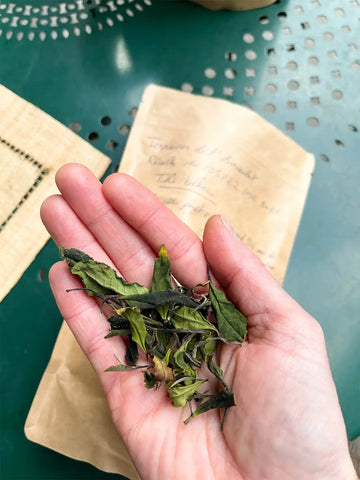Gregory, founder of Maison un air de thé, met Lucas Ben-Moura, planter of the first tea garden in the Pyrenees.

I have always secretly dreamed of being able to visit tea plantations in my own country, or even in my native region. Knowing it well, its Pyrenean terroir seemed conducive to the acclimatization and development of the tea plant and gave me hope that one day, a planter/producer would dare to embark on the adventure of a French tea. My dream has been granted because since then, several men and women have tried to plant tea successfully. Of course, their plantations are only in their infancy, but the whole future of tea lies before them.
1- Since 2020, Maison un air de thé has supported this wonderful adventure!

Photograph taken by Grégory Lehoux, a tea party
Curious to know a little more about this subject, I did some research and discovered the existence of a tea garden project located in a part of the Hautes-Pyrénées that I know particularly well, the Gaves valley in Bigorre. This project had been carried out since 2018 by Lucas Ben-Moura, originally from the region, who had already started planting a few tea plants on his family land, Les Terrasses de L'Arrieulat . In 2020, he then published a participatory call on his website to find sponsors who could help him finance his tea adventure. So I naturally responded with envy and admiration.
2- The first visit to the “Les Terrasses de l'Arrieulat” plantation in October 2022
During 2020, I was able to have a first remote contact with Lucas through which we were able to get to know each other and exchange ideas about our shared passion for tea. In October 2022, after waiting for his first tea harvest in the spring of the same year, I was able to meet him on his land, in order to immerse myself in his project and rediscover more intimately this terroir that we share. Lucas showed me around his tea garden and presented in detail the different plots of his plantation arranged in terraces, that is to say in stepped areas on sloping land and raised by small stone walls.
- Acclimatization of different tea plants
The Arrieulat terraces extend over an area of 5,000 m², where approximately 3,500 tea plants are planted. Each plot contains different varieties of tea plants, from China, Nepal, Turkey, or from the tea garden of a Breton couple, Denis and Weizi Mazerolle. This diversity of tea cultivars is a good way to test the acclimatization of the shrubs to their new environment.
|
|
|
|
- An organic culture
Lucas has chosen to practice organic farming, using no herbicides, pesticides, or synthetic fertilizers. During this visit, we discussed the various agricultural issues related to this environmentally and human-friendly crop, particularly those related to water and weeding. Irrigation is done naturally, using water from the spring found in the subsoil of his land. Weeding, meanwhile, is done entirely by hand, with all the labor-intensive challenges that this entails.
- A plot planted with agroforestry to better withstand climatic hazards
3- A first tasting of the teas from this beautiful plantation
After this exciting moment of discovering his natural setting, Lucas gave me the pleasure of tasting a tea from his very small production, harvested and manufactured a few weeks earlier. Indeed, the drought due to the heatwave of summer 2022 clearly did not help his production, which was then anecdotal.
 |

|
 |
So we tasted its white tea, made from a Nepalese cultivar with large, majestic leaves in multiple shades of green. This beautifully delicate tea offered us a very pleasantly sweet liqueur with fresh citrus notes. A delicious and very thirst-quenching tea.
Lucas also produces green and black tea, complementing white tea—the three essential colors of tea. But of course, before he can produce sustainably and permanently, the different varieties of his tea plants will need time to acclimatize to the terroir and take deep root in their Pyrenean soil, just like Lucas.
- The project to create a processing and tasting workshop

Gregory

Photograph taken by Grégory Lehoux, a tea party
|
The story of an agricultural engineer / tea planter in the Pyrenees. Originally from Béarn and Bigorre, Lucas Ben Moura developed a passion for agriculture at an early age. His training as an agricultural engineer at AgroParisTech made him an expert on his terroir: his research thesis focused on the agrarian diagnosis of the Baigorri Valley. In addition, his numerous travels to Asia (Indonesia, Laos, China, Nepal) allowed him to learn about tea and deepen his knowledge of tea cultivation. In 2018, he decided to create the first tea garden in the Pyrenees. The website of Les Terrasses de l'Arrieulat Subscribe to their Instagram account
|








Bonjour, passionnant ce reportage. En souhaitant que notre terroir pyrénéen soit propice à cette belle initiative qui contribue à la diversification des productions agricoles de ce beau terroir.
Leave a comment